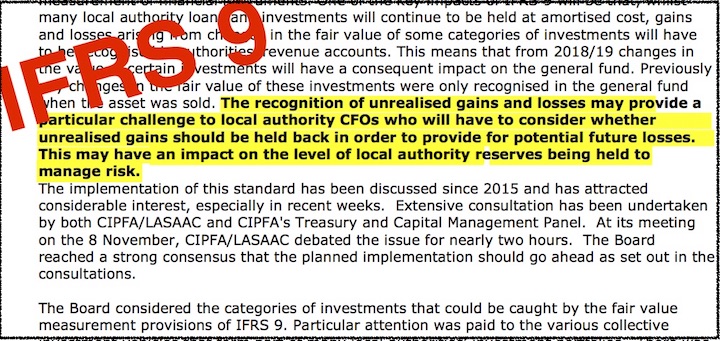
Government officials say they will need very strong evidence from councils before ameliorating IFRS9 rules adopted last week which require local authorities to account for pooled investment losses and gains in their general funds.
Following a two hour debate, The CIPFA/LASAAC board last week approved the adoption of IFRS9 investment regulations into the Local Authority Accounting Code, affecting local authorities from 1 April 2018.
Prior to the meeting, the board faced calls to lobby for a “statutory override” from the provision, which, according to Sean Nolan, director of local government at CIPFA, could cause “perverse outcomes”.
A statement released on behalf of the board said: “There was some sympathy for the view that some form of statutory override might be appropriate, particularly relating to the treatment of existing unrealised gains or losses on transition at 1 April 2018.
“Representatives from central and devolved governments in attendance at the meeting confirmed that they would be willing to consider representations from local authorities in this area informed by evidence.”
The board statement continued: “The recognition of unrealised gains and losses may provide a particular challenge to local authority CFOs who will have to consider whether unrealised gains should be held back in order to provide for potential future losses.
“This may have an impact on the level of local authority reserves being held to manage risk.”
It is understood that Gareth Caller, head of the Local Government Finance Unit at the Department of Communities and Local Government (DCLG), told a local authority accounting conference this week that his department was willing to listen to arguments for an override.
He said claims would have to relate to the effect of significant charges to the revenue account on transition, or because ongoing volatility would be introduced.
He added that the department would require evidence that the sums involved were substantial.
But he is understood to have said that regulations might be effective for the 2018/19, if they were issued by 31 March 2019.
Speaking to Room151 last week, Danny Mather, corporate finance manager of Warrington Borough Council said: “The standard also covers more ‘conservative’ instruments such as VNAV and enhanced money market funds whilst movements in these are expected to be small, others such as property, bonds, gilts etc could be large.”
One local authority treasurer, who did not want to be named, told Room151 there was more sympathy for introducing protection for those affected at the point of transition than for transactions going forward.
He said: “You can envisage a situation where an authority recently took out an investment they knew was likely to have some short-term volatility but thought the long-term gain was worth the price.
“You need to think about having some way that moving losses on that investment into the general fund doesn’t have serious effects.”
The board agreed to issue further guidance on the application of IFRS9 to assist in implementation of the standard.












